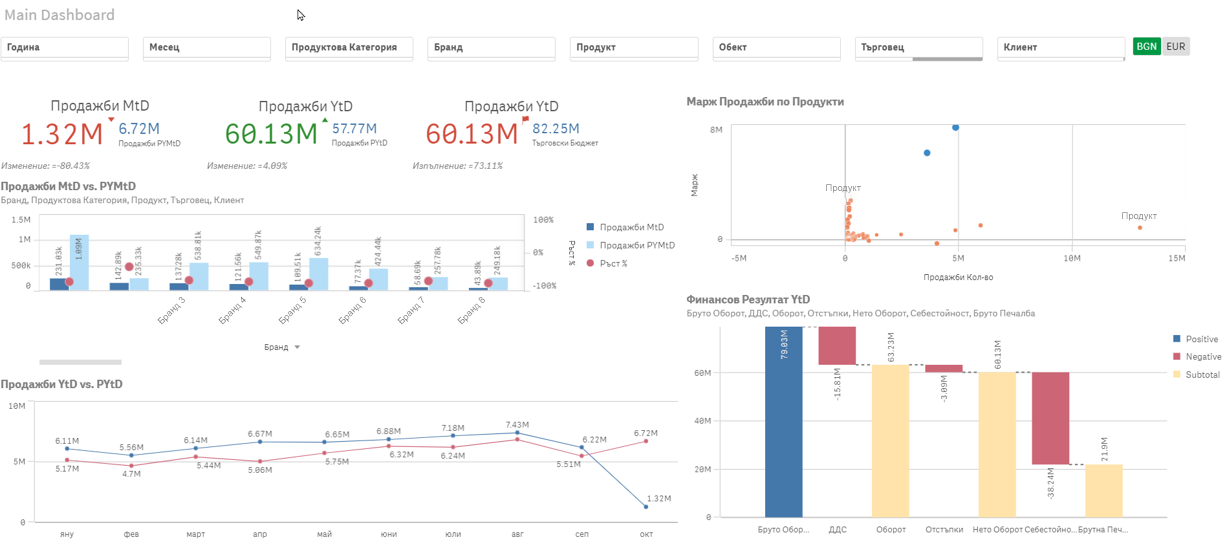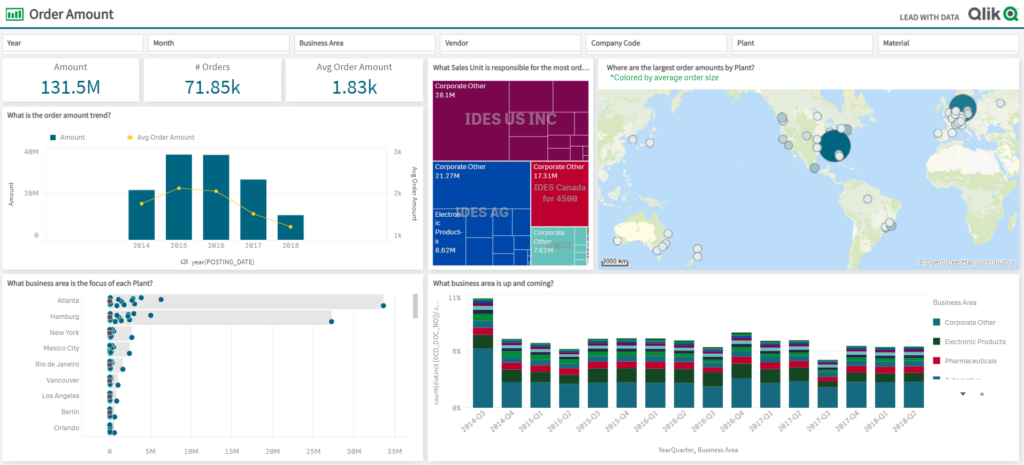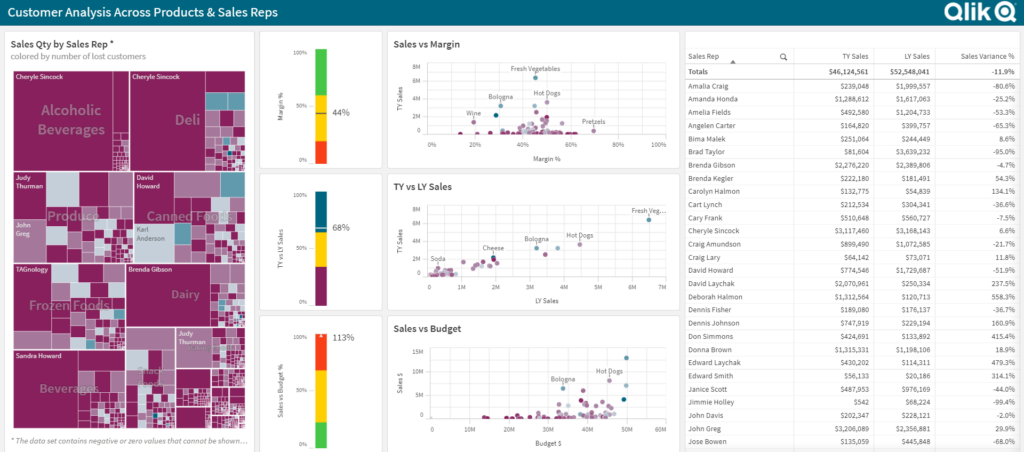Contact information.
-
Address"Ekzarh Yosif" street, 31, 1000 Sofia, Bulgaria
-
Phone:+359 2 980 95 99
-
Websitewww.balkanservices.com

The term Business Intelligence (BI) is not new to the technology world, but its importance and value to businesses have been growing at a rapid pace recently.
If 15 years ago the term business intelligence sounded more exotic, today the success of organizations, the right and well-founded decisions, and staying ahead of the competition go hand in hand with the use of specialized business software.
BI is not just a product or a system in the sense that we put in those words. Rather, it is a set of tools that provide companies with the ability to use available data presented in an understandable way.
Business Intelligence includes the processes, tools, and technologies needed to turn data into information, and information into knowledge and plans that suggest quick and effective business actions and support decision-making.
It is through BI tools that users receive secure, consistent, understandable, easy-to-process, and timely information that creates the prerequisites for informed decision-making.
Or to systematize, Business Intelligence software:
The goal is to make the results of the analyses available at any time and from any place to decision-makers in companies and to analysts who can use their time to look for dependencies, identify opportunities, and take action when problems arise.
Qlik Sense Dashboard

Business analytics systems combine a wide range of data analytics applications, including impromptu (ad hoc) analytics and queries, enterprise reporting, target reporting and future predictions, mobile BI, real-time BI, operational BI, cloud and SaaS BI, and more.
The popularity of using business analytics tools today is largely driven by the boom in big data. More and more BI tools are being used as front-end interfaces for Big Data.
Modern business intelligence software typically has flexible back-end interfaces, allowing it to connect to different data sources. This, along with easy-to-use user interfaces, makes BI tools suitable for connecting to Big Data architectures.
In general, business analytics solutions build on operational software systems – transactional or management (e.g. ERP, CRM, etc.) by using, combining, and visualizing data from them.
They help you understand not only WHAT is happening, but WHY it is happening. Their main task is to work with a large data set with diverse cross-sections that on the one hand show results over long periods of time, and on the other show different perspectives of the information.
So why should one use business intelligence? The answer is clear and logical – because it provides organizations with a number of benefits. Among them we can distinguish:
By seeing your entire business on one screen, you can easily manipulate information, quickly identify different correlations, issues, and opportunities, gain valuable insights, clean up errors, and improve processes.
Along with this, BI tools allow you to track the performance of the company strategy on a large number of indicators(KPI’s), while automating the reporting process.
Our team is here to listen carefully and offer the right solution for you.

If you’re a company manager, you’ve probably often asked yourself questions that have been difficult or slow to find answers to.
For example, can you pinpoint the customer with the highest growth in sales of high-margin products, or who are your potential customers who were interested in a product in Q1/2022, approached your competitors, bought nothing, and made a new inquiry to you in Q3/2022?
Or at what times what goods are bought and by whom, or to predict potential products that will become obsolete goods, or how much is the net profit from a brand or service? Or, or, or…
There are so many questions, and by using an analytics platform on a daily basis, you’ll get used to getting their answers right away, as well as finding more facts as you “play” with your own data and results.
Qlik Sense dashboard

It is the management of a company that can most fully benefit from the advantages of a BI system. Thanks to it, they can track data and have all business information collected in one place and available on the computer screen.
Moreover, it is the same for the entire organization and for all departments of the company. This information and the analyses achieved thanks to it help to optimize processes in the organization, to see the benefits of the ERP system; to make faster and more informed decisions; to preserve knowledge and data in the company, to detect technical errors more easily, and last but not least – to free up the time of key employees.
It probably happened to you that you needed greater visibility and traceability into the market and the sales department’s activities. You’ve needed to implement different cost allocation and allocation models based on revenue or effort.
Or are you wasting money and opportunities, acting on gut feel and not knowing what your individual salespeople have sold, whether they have met targets, who your most lucrative and loyal customers are, or which product has the greatest sales potential? Or do you lack comparability and traceability and have difficulty forecasting?
Businesses are growing and the complexity of interrelationships and data across different systems cannot fit into one human head, and Excel has long been stultifying. You can certainly name many other problems you face that are specific to your line of business.
Qlik Sense Dashboard

The solution in these cases is a business intelligence software.
Through it, thanks to the multiple visualizations available in a single application, you can track information across different cross-sections, discover hidden opportunities, and make informed decisions based on multiple different sources (ERP, CRM, Excel, web, etc.).
Specialized software allows you to track key performance indicators (KPIs) and customize the analysis and reporting process depending on your company’s strategy.
Following the global trend towards the cloud, cloud-based business intelligence software is becoming increasingly popular. In cloud BI tools, the processes related to business analysis are performed in the BI software vendor’s infrastructure rather than on the company’s physical servers.
When an organization uses cloud-based BI the setup and maintenance of the solution is usually performed by the platform vendor or its partner. Thus, analyzing data in the cloud allows employees to focus on extracting valuable insights from company data rather than routine tasks.
According to Gartner*, by 2023, 40% of all business software will be deployed in the cloud, up from 20% in 2020. Businesses are realizing that analytics is a critical point and companies are no longer worried about deploying and using cloud-based data analytics solutions.
Ready to take your business one step further? If yes, check out one of Gartner’s BI leaderboards for the last 13 years here >